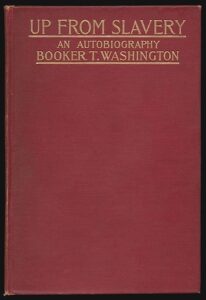
Up from Slavery
*Up from Slavery is celebrated on this date in 1901. This book is the autobiography of Black educator Booker T. Washington.
The book was first published as a serial in 1900 in The Outlook, a Christian newspaper of New York. It was serialized so that Washington could receive feedback from his audience during the writing and could adapt his work to his diverse audience. Up from Slavery chronicles more than forty years of Washington's life: from slave to schoolmaster to the face of southern race relations. In this text, Washington ascends the social ladder through hard manual labor, a decent education, and relationships with influential people. Throughout the text, he stresses the importance of education for the black population as a reasonable tactic to ease race relations in the South (particularly in the context of Reconstruction).
The book describes his experience of being enslaved as a child during the Civil War, the obstacles he overcame to get an education at the new Hampton Institute, and his work establishing vocational schools like the Tuskegee Institute in Alabama to help Black people and other persecuted people of color learn useful, marketable skills and work to pull themselves, as a race, up by the bootstraps. He reflects on the generosity of teachers and philanthropists who helped educate Black and Native Americans. He describes his efforts to instill manners, breeding, health, and dignity into students. His educational philosophy stresses combining academic subjects with learning a trade. Washington explained that the integration of practical subjects is partly designed to "reassure the White community of the usefulness of educating Black people."
Washington was a controversial figure during his lifetime, and W.E.B. Du Bois, among others, criticized some of his views. The book was a best-seller, and remained the most popular African American autobiography until that of Malcolm X. In 1998, the Modern Library listed the book at No. 3 on its list of the 100 best nonfiction books of the 20th century, and in 1999 it was also listed by the conservative Intercollegiate Review as one of the "50 Best Books of the Twentieth Century." The book presents Washington's traditional, non-confrontational message, supported by the example of his life.